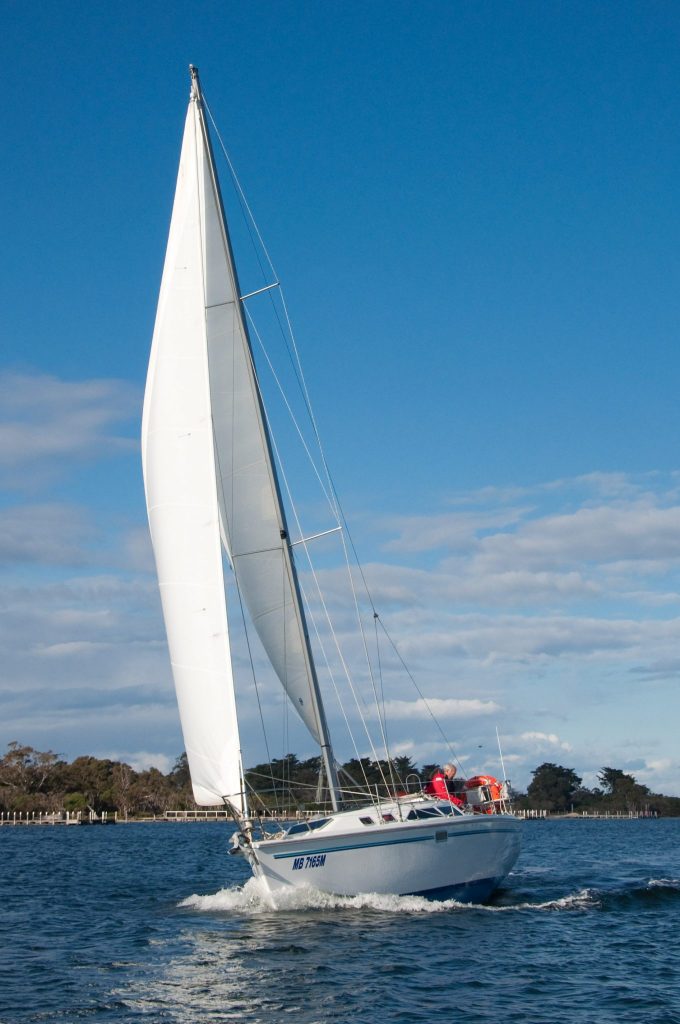School Camps - Ideas and Curriculum
Meeting Curriculum Needs
A sailing camp fulfills two academic requirements for students:
1. Outdoor adventure
2. Research into understanding the patterns of a selected outdoor venue for recreation, commerce and conservation Outdoor adventure:
Sailing is an adventurous sport and the sailing experience on the Gippsland Lakes will provide abundant material for writing about adventure. In addition, there is:
- working as a team on board
- being mindful of issues such as safety and conservation
- being aware of weather conditions and navigation issues
- having access to other forms of adventure: bushwalking in the national parks and along the ocean beach
The interface between recreation, commerce and conservation can be made readily evident using the boats as a means of exploring the Gippsland Lakes environment:
- the impacts of the user groups – agriculture, tourism, recreational and commercial fishermen, and industry, especially Latrobe Valley industry
- the changes to the lakes’ system which have resulted from practices such as the construction of an artificial entrance and goldmining in the catchment
- the formation of the lakes’ system: the creation of sand barriers and the Mitchell River silt jetties
- the Gippsland Lakes Coastal Action Plan and other documents offer a wealth of carefully researched material to support the students’ observations
Extracts of Quenstionnaire
Previously, we sent a questionnaire to teachers who had conducted Riviera Nautic school sailing camps. Here are extracts of their responses.
Types of Groups
VCE outdoor and environmental studies at 3 /4 level
Victorian Youth Development Program – year 10
Australian Navy Cadets – years 9 and 10
Duke of Edinburgh
Outdoor education – year 10
Length of Sailing Camp
3 days – the students requested longer
4 days – need that amount of time for students to get used to handling the boat and build confidence
3 days plus – allows time for routines and skills to develop
6 days – to get a mixture of weather
Objectives of Sailing Camp
provide an opportunity for personal development and community living
provide challenge; increase self-esteem and independence; promote team work
unique experience; teamwork
introduce students to cooperative decision making through sailing and living on board
maximise student involvement; get to know students; overcome difficulties/challenges; have a good time
Suitability of Sailing Camps
opportunity for personal development and skills in sailing
for students – something positive to look forward to and to reflect upon
students have to plan their own menus, work as a team
exposes students to issues affecting The Lakes in a challenging and motivating environment
students sail the boat, cook the food, interact with each other in front of teachers
the weather provides a challenge
Benefits of using Boats as a Resource
hands on sailing experience
promotes small group interdependence
boat only sails if crew acts as a team
challenge of sailing and navigation
must maintain cleanliness of the boat
students take more pride as they see the boats as their own
small groups working together – supporting and sharing
opportunity to observe Lakes’ environment
develop skills and knowledge in yacht handling
Benefits of using he Gippsland Lakes as a Resource
good venue for the introduction to sailing
enclosed body of water
all points accessible for rescue
safe environment; clear navigation; lots of environmental aspects
interesting history – indigenous and European; interesting issues -development/ tourism impact
good places to visit
Unexpected Benefits
Sometimes you get students becoming very good leaders. You don’t get to see that at school in many circumstances.
Many benefits, but like many educational outcomes they are intangible, but of immense importance to overall scheme of a broad education: environmental, social, self-esteem, etc
Camp Ideas…
School sailing camps are usually for three to five days, sailing and living on board the boats. Normally, the group is divided into four or five students with one adult (with sailing experience) per boat. While this is the norm, there are plenty of other options. Some recent examples include:
Boats and the Environment
The school booked onshore accommodation and chartered one eight berth yacht for five days. Each day a teacher took a group of students sailing and they spent the night on the yacht.
Over the course of the five days, all students had the opportunity to sail. At other times, students were occupied with exploring the on-shore environment around the Lakes.
Discover East Gippsland & Learn to Sail
DAY ONE: students explored the natural heritage of East Gippsland, including Buchan Caves and arrived at Riviera Nautic in the late afternoon to be accommodated on the boats.
DAY TWO: a Riviera Nautic sailing master was assigned to each boat, and the morning was spent learning to sail. In the afternoon, students were put to the test with a yacht race.Later in the day, the Gippsland Water Police gave a talk on boating safety. The students spent the second night on board the yachts.
DAY THREE: there were further East Gippsland explorations, then students returned to Melbourne.
Boating and the Environment
Students spent five days on the Gippsland Lakes: two on shore at a caravan park in Paynesville, and the balance on board the yachts.
While in Paynesville, Parks Victoria rangers and representatives of the Gippsland Lakes Coastal Board talked to them about environmental issues.
While on board the boats, as well as the sailing, they were able to build on what they had learned from the speakers.
